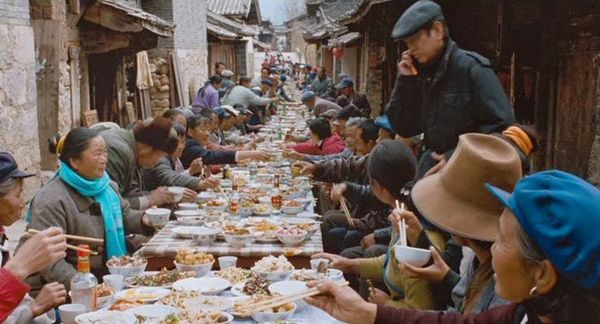Eye For Film >> Movies >> Riding Alone For Thousands Of Miles (2005) Film Review
Riding Alone For Thousands Of Miles
Reviewed by: Amber Wilkinson

This film marks something of a departure from director Zhang Yimou's recent films. While his keen eye for the grand sweep of a landscape is still very much in evidence, this is first and foremost an affair of the heart, more akin to Not One Less (1998) than more recent extravaganzas such as Hero (2002) or House Of Flying Daggers (2004). Also unusual for Yimou, is the contemporary setting and the language, for the most part Japanese.
Mr Takata (Ken Takakura, frequently referred to as the Japanese “Clint Eastwood”) has a fractured relationship with his son Ken-ichi (Kiichi Nakai). When Ken-ichi’s wife Rie (Shinobu Terajima) calls to tell him her husband is seriously ill, Takata heads to the hospital, only to get no further than the door, since Ken-ichi won’t see him. Attempting to strike a truce, Rie gives her father-in-law a tape, which sees him embark on a physical and emotional quest.

The tape is a recording by Ken-ichi – a collector of Chinese folk art – which shows him in China, taping a mask opera. The star of the show is Li Jiamin (played by an actor of the same name), who tells Ken-ichi that if he returns the following year, he will perform the best version of classic Chinese opera Riding Alone For Thousands Of Miles for him. With Ken-ichi at death’s door, Takata decides to fulfil his son’s wish and sets off on his own lonely journey to a remote province of China. On arrival, like those knights in quests of old Takata discovers his task will not be as simple as it first appeared. The complications see him forced to contemplate the meaning of fatherhood and emotion in a way he hasn’t before and lead to his quest of the heart. As with all quests, the journey is as important as the destination.
The parallel between the opera’s title and Takata’s journey is obvious but there is much more nuance to this movie than that simple comparison would suggest. The sense of being alone is magnified, since Takata speaks no Chinese and therefore relies on his translator Jasmine (Jiang Wen) and her pal, ironically named Lingo (Lin Qin), who provides comic relief with his attempts to translate for Takata, despite having only a very basic grasp of Japanese.
By showing Takata fighting with Chinese red tape through a language barrier, Zhang Yimou clearly establishes the sense of isolation, which is carefully mirrored by other situations and characters elsewhere in the film. Equally, the use of the mask opera is important, since it highlights the nature of emotions - powerful undercurrents, even if they aren’t visible on the surface.
As ever, Zhang Yimou has something to say about the nature of bureaucracy in China, here represented by string of government departments who initially dismiss Takata out of hand. But this is not a film which dwells on negativity. The people of China are more than willing to bend the rules to try to help Takata find what he seeks – even if the goal isn’t what he first imagined.
This may be one man’s story but the themes are epic. As much a statement on China’s relationship with outsiders as a tale of familial love, this is a story as rich in layers of detail as Hero and Curse Of The Golden Flower are rich in colour. Takata, as the central figure, puts in a statesman-like performance of a man taking an emotional journey. His stoic determination to shoot the opera for his son is something we can all relate to – the need to do something for another - and his powerful performance is more than a match for Yimou’s careful camerawork, which manages to be simultaneously understated and breathtaking.
While Riding Alone For Thousands Of Miles may come as a disappointment to fans looking for lavish pomp and flashy set pieces, those prepared to make the journey with Takata will not go unrewarded.
Reviewed on: 09 Mar 2007
















